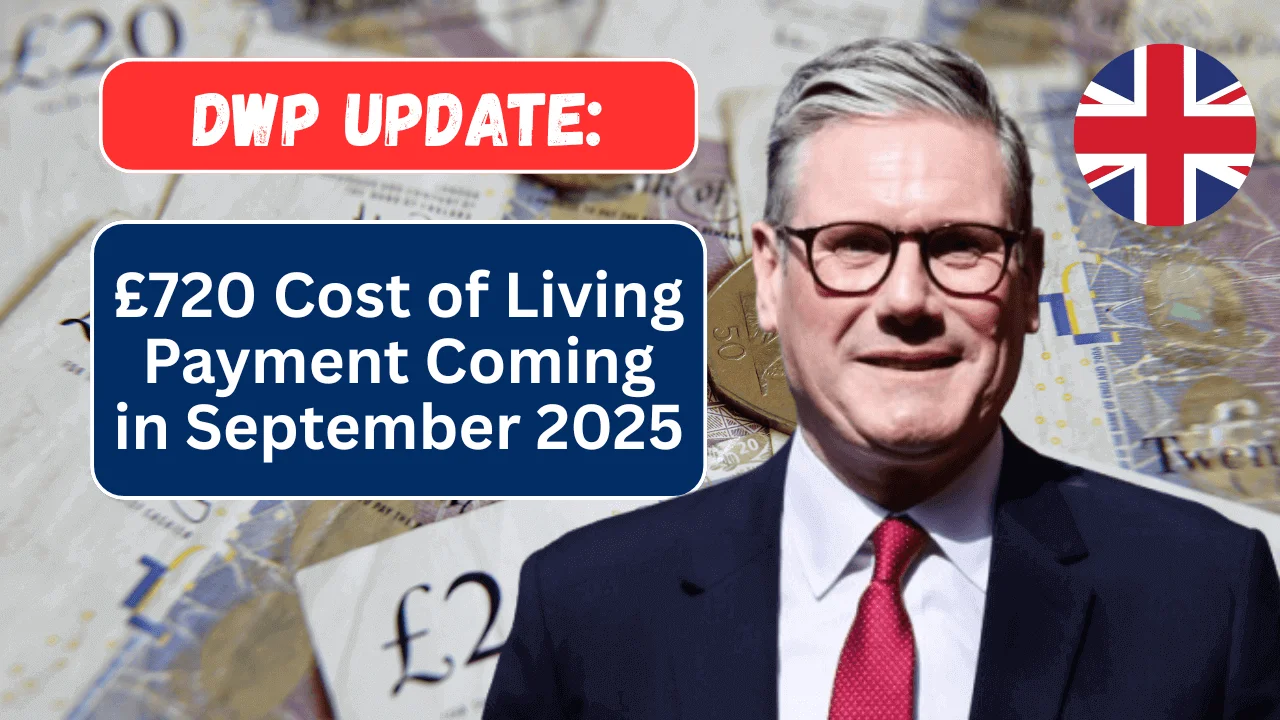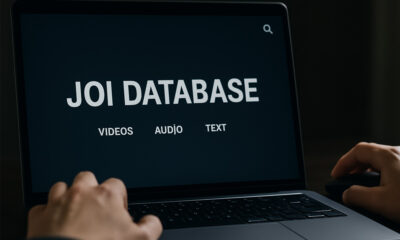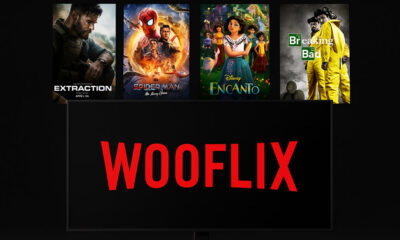News
DWP Cost of Living Payment 2025: Who Gets It and When?
Published
2 days agoon
By
Admin
The cost of living in the UK is still a big problem in 2025. Prices of food, rent, and energy bills are still high, even though inflation has slowed down a bit. For many families, it’s still hard to keep up with monthly expenses. That’s why the government, through the Department for Work and Pensions (DWP), has confirmed a £500 Cost of Living Payment to support people who need help the most.
This article will guide you through everything you need to know about this payment. We’ll explain who will get it, when the money will come, and how it will be paid. We’ll also cover other types of support available this year. If you’re not sure whether you qualify or how to check, don’t worry — we’ll explain it all in a very simple and clear way.
What Is the DWP Cost of Living Payment 2025?
The DWP Cost of Living Payment 2025 is a one-time payment of £500 from the UK government. It’s meant to help people who are finding it hard to pay for daily essentials like food, gas, and electricity. The money is being given to people who already get certain types of government benefits.
This payment is different from the ones given between 2022 and 2024. During those years, people received smaller amounts in multiple parts. But in 2025, this new payment is one single lump sum of £500, and it will arrive between September and October 2025.
It’s a way to give people some relief, especially as we head into the colder months when heating and food bills often go up. This money is meant to be a helping hand, not a full solution — but for many, it can make a real difference.
Who Will Get the £500 Payment?
Not everyone will get this payment. The DWP has said that only people who were receiving certain means-tested benefits during the qualifying period will be eligible. These benefits include:
-
Universal Credit
-
Pension Credit
-
Income Support
-
Income-based Jobseeker’s Allowance (JSA)
-
Income-related Employment and Support Allowance (ESA)
-
Working Tax Credit or Child Tax Credit (administered by HMRC)
If you were getting one of these benefits during the time DWP checks (called the “qualifying period”), you don’t need to do anything. You will automatically get the £500 in your bank account.
For example, if you’re a single parent receiving Universal Credit, and you were on it during the set dates, you’re likely eligible. But if you started receiving benefits after the qualifying period, you may not get this payment.
When Will the Payment Be Made?
The £500 Cost of Living Payment will start being sent out from 15 September 2025. However, not everyone will receive it on the same day. The DWP is rolling out the payments in batches over several weeks. So, if your friend or neighbor got theirs already and you didn’t — don’t panic. It might just be on the way.
This process is done to avoid system overload and to make sure payments go out smoothly. The DWP says all eligible households should receive their payment by the end of October 2025.
Let’s say you usually receive your benefit on a Wednesday. You might get your £500 payment on or around that day — but it could still come earlier or later depending on your area and bank. Patience is key, but if you still don’t see it by late October, you should contact DWP or HMRC.
How Will the DWP Payment Be Sent?
The good news is, you don’t need to apply for this payment. It will be sent automatically to the same bank account where you normally get your benefits. No forms. No extra paperwork. Just wait for it to land in your account.
When it arrives, it will appear with a payment reference like “DWP COLP” (which stands for Cost of Living Payment). This helps you know it’s the right payment and not something random or suspicious.
Here’s a quick tip: make sure your bank account details are up to date with DWP or HMRC. If you’ve recently changed your bank or closed an account, let them know right away. A small mistake in bank info could delay your payment by weeks.
How to Check If You Qualify
If you’re unsure whether you’ll get the £500, there are a few easy ways to check.
-
First, look at your benefit statements (either letters or your online account).
-
Check if you were receiving any of the qualifying benefits during the official dates (which will be confirmed by DWP).
-
Use tools like the Turn2us Benefits Calculator or visit GOV.UK to see what support you’re getting and what else you may qualify for.
Here’s an example: Emma is 64 and receives Pension Credit. She’s been on it since early 2024. That means she likely qualifies for the £500 payment, as she’s already receiving a benefit on the list. But Tom, who only started his Universal Credit in late August 2025, may not qualify — because he missed the qualifying period.
What to Do If You Don’t Get the Payment
Most people who are eligible will get the money without needing to do anything. But sometimes, things don’t go as planned. If you believe you should get the payment but you haven’t received it by the end of October 2025, there are a few steps you can take:
-
Check your benefit status first — make sure you were receiving a qualifying benefit at the right time.
-
If everything looks right but no payment has arrived, call or write to the office that pays your benefit. That could be DWP or HMRC, depending on the benefit you receive.
-
Ask them to review your case, especially if you think you were missed due to a system error.
The DWP has said they use an automated system to identify who gets the payment. While it usually works well, some people may be overlooked. If this happens to you, you have the right to ask questions and get it checked.
Other DWP Payments in 2025 You Should Know
The DWP Cost of Living Payment 2025 is just one part of the help available this year. There are other small but helpful payments you might get, depending on your situation.
One of them is the Christmas Bonus. It’s a small one-time payment of £10, given to people who are already receiving certain benefits. It’s not much, but it’s tax-free and automatic. You’ll usually get it in early December, and it will show in your bank as “DWP XB.”
Another is the Cold Weather Payment. From November 1, 2025 to March 31, 2026, if your area has 7 days in a row of freezing weather (0°C or lower), you can get £25 for each cold week. This payment is also automatic if you qualify. So, if you’re on Universal Credit, Pension Credit, or certain other benefits, you don’t need to apply—just check your bank if it gets really cold.
Household Support Fund and Local Help
Aside from national payments, there’s also help coming from local councils through something called the Household Support Fund (HSF). This fund is designed to help people who are struggling with things like rent, food, and energy bills.
Between April 2025 and March 2026, councils are using this money to give £130 to £600 to those in need. But this help depends on where you live and how your local council decides to use their share. Some give out food vouchers, others give direct bank payments.
If you want to apply, the best way is to visit your local council’s website. Most councils have an online form. Just fill in your details and explain your situation. If approved, you could get help quickly.
Warm Home Discount and Energy Help
One big cost during winter is heating. That’s why the government is also running the Warm Home Discount. This gives a £150 discount on your electricity bill, not as cash, but as credit directly on your account.
You don’t need to apply in most cases. If you qualify, your energy company will apply the discount automatically between November 2025 and March 2026. You’ll see it on your bill, and your total amount owed will go down.
Some energy companies also have extra support programs for people struggling to pay. If you’re having trouble with bills, call your supplier. British Gas, EDF, E.ON, Octopus, and Scottish Power all offer help like grants or debt relief for certain customers.
Universal Credit Changes in 2025–2026
If you’re on Universal Credit, there’s some important news you should know. Starting in April 2026, all claimants will get a yearly increase that’s higher than inflation. This is part of a new law passed by the government to make benefits rise faster for people who need help.
But there’s a downside too. The extra amount for people with health issues or disabilities (called the “health-related element”) will drop from £105 to £50 for new claimants. That’s a big cut, and it will stay frozen until 2029.
If you think you qualify for that part, it might be smart to apply before April 2026, so you don’t miss out on the higher rate.
Backdated Payments
Some people didn’t get past cost of living payments even though they believe they were eligible. If this happened to you, you might still be able to claim.
DWP says it uses a computer system to decide who gets the payments. Sometimes, mistakes happen. If you think you were missed, you can call or write to the office that pays your benefit. Ask them to review your case and explain why you were left out.
You can also send more information if you think it will help. For example, if you were switched to a new benefit during the qualifying period and the system didn’t pick it up, that could be why.
Other Useful Help You Might Be Missing
Aside from these government payments, there are more ways to get help if money is tight.
-
Budgeting Advance Loans: If you’re on Universal Credit and need help with emergency costs, you can apply for a loan of up to £812. It’s interest-free and taken out of your future payments over time.
-
Council Tax Reduction: You might qualify for up to 100% off your council tax, depending on your income or benefits. Some councils also offer discretionary discounts if you’re in serious hardship.
-
Free Childcare: Starting 1 September 2025, working parents can now get 30 hours of free childcare each week for children under 4. This is a big help for working families.
-
Charity Grants: Websites like Turn2us can help you find free money based on your situation—whether you’re disabled, a student, unemployed, or caring for someone.
-
Mental Health & Support Services: If money worries are affecting your health, charities like Mind, Samaritans, and Scope are there to talk and help. You’re not alone.
Final Thoughts
The DWP Cost of Living Payment 2025 is a much-needed boost for millions of people across the UK. With £500 coming in September and October, it can really help with everyday expenses during this difficult year.
If you’re on benefits, check your eligibility, keep your bank details updated, and watch for the payment. Also, take time to look at other help available — from winter fuel support to local council funds and childcare discounts. Even small payments can make a big difference.
If you’re not sure where to start, use benefit calculators or contact Citizens Advice. It only takes a few minutes to check — and you might be missing out on support you truly need.
You may also read, Princess Royal Parcel Hub

Who Is Rich Orosco? All About Julie Benz’s Husband and His Amazing Career

Who Is Dee Jay Mathis? Meet James Caan’s Mysterious First Wife

Sam Waterston’s Wife, Lynn Louisa Woodruff: Her Story, Career, and Family

Where Is Lori McCommas Now? The Untold Story of Terrence Howard’s First Wife

Who Is George Santo Pietro? Meet Vanna White’s Ex-Husband and Real Estate Tycoon

Chandler Belfort’s Life in 2025: What Jordan Belfort’s Daughter Is Doing Now

Get to Know Mary Carey Van Dyke: Carey Van Dyke’s Mother and Wife of Barry

Who Is Darah Trang? Meet Anson Mount’s Talented and Inspiring Wife

Teil Runnels: The Untold Story of Dusty Rhodes’ Daughter

What Is Cierra Wight Doing Now? The Story of Big Show’s Daughter

Curious About JOI Database? Read This First Before You Click Anything

Should You Use Wooflix in 2025? Honest Review and Best Alternatives

ECMISS: The Intelligent System Behind Smarter Everything

Where Is Noelle Watters Now? Jesse Watters’ Ex-Wife’s Life After Divorce

Is F2Movies Safe to Use? The Truth Nobody Tells You

Who Is Marlene Knaus? The Untold Story of Niki Lauda’s First Wife

Swizz Beatz Net Worth 2025: How Rich Is Alicia Keys’ Husband Now?

Who Is Dorothée Lepère?: All About François-Henri Pinault’s First Wife

Where Is Anne Steves Now? The Truth About Rick Steves’ Ex-Wife

Who Is Raquel Pedraza? Meet Taylor Fritz’s Tennis Star Ex-Wife

Who Is Rich Orosco? All About Julie Benz’s Husband and His Amazing Career

Who Is Dee Jay Mathis? Meet James Caan’s Mysterious First Wife

Sam Waterston’s Wife, Lynn Louisa Woodruff: Her Story, Career, and Family

Where Is Lori McCommas Now? The Untold Story of Terrence Howard’s First Wife

Who Is George Santo Pietro? Meet Vanna White’s Ex-Husband and Real Estate Tycoon

Chandler Belfort’s Life in 2025: What Jordan Belfort’s Daughter Is Doing Now

Get to Know Mary Carey Van Dyke: Carey Van Dyke’s Mother and Wife of Barry

Who Is Darah Trang? Meet Anson Mount’s Talented and Inspiring Wife

Teil Runnels: The Untold Story of Dusty Rhodes’ Daughter

What Is Cierra Wight Doing Now? The Story of Big Show’s Daughter
Categories
Trending
-

 Entertainment2 months ago
Entertainment2 months agoCurious About JOI Database? Read This First Before You Click Anything
-

 Entertainment2 months ago
Entertainment2 months agoShould You Use Wooflix in 2025? Honest Review and Best Alternatives
-

 Technology2 months ago
Technology2 months agoECMISS: The Intelligent System Behind Smarter Everything
-

 Celebrity1 month ago
Celebrity1 month agoWhere Is Noelle Watters Now? Jesse Watters’ Ex-Wife’s Life After Divorce
